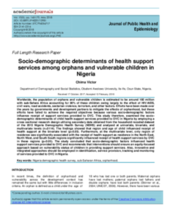Abstract
Worldwide, the population of orphans and vulnerable children is estimated to be around 160 million with sub-Sahara Africa accounting for 80% of these children owing largely to the effect of HIV/AIDS, civil wars, road accidents, sectarian violence, terrorism, and other factors. Efforts have been made over the years by governments and development partners to mitigate the effects of orphanhood, but these efforts have failed to achieve the required objectives because various socio-demographic factors influence receipt of support services provided to OVC. This study therefore, examined the sociodemographic determinants of child health support services provided to OVC in Nigeria by employing a cross sectional research design utilizing secondary data obtained from the household recoded dataset of the 2013 Nigeria Demographic Health Survey (NDHS) and analyzed at univariate, bivariate, and multivariate levels (n=5114). The findings showed that region and age of child influenced receipt of health support at the bivariate level (p<0.05). Furthermore, at the multivariate level, only region of residence was significantly associated with the receipt of health support as residence in the North East, North West, and South South regions significantly influenced receipt of health support services by OVC in these regions (p<0.05). The study concluded that socio-demographic factors influenced health support services provided to OVC and recommends that interventions should ensure an equity-focused approach based on vulnerability status of children in providing support services. Also, innovative and integrated approaches should be employed in identification, service provision, tracking and monitoring of services provided to OVC in Nigeria.

